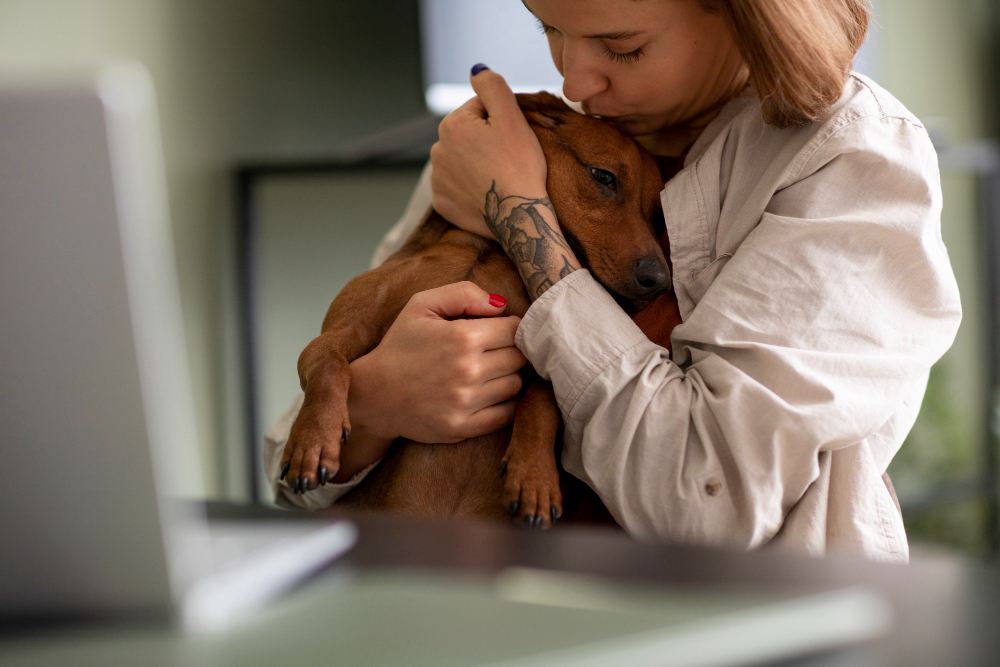Understanding Pet Hospice Care: Compassionate Support for Furry Family Members in Their Final Days

Understanding Pet Hospice Care: Compassionate Support for Furry Family Members in Their Final Days

For any pet lover, the idea of losing a cherished companion can be a deeply distressing prospect. We adore our pets, and when they fall ill with a terminal condition, the question of their quality of life becomes paramount. In these emotional and often confusing times, pet hospice care emerges as a beacon of compassion and support, ensuring that our furry friends can live their final days in comfort, dignity, and peace.
This approach to end-of-life care for pets is relatively new but rapidly gaining recognition and appreciation within the veterinary community. Here, we'll explore what pet hospice care is, how it differs from traditional veterinary care, and why it's an invaluable option for those with terminally ill pets, particularly in the serene settings of Jupiter, FL.
Understanding Pet Hospice Care
Pet hospice care is a specialized model of compassionate support, similar to the human hospice care approach, focusing on the comfort and quality of life of terminally ill pets. The primary goal is to ensure that your pet experiences minimal to no pain or distress in their final days, weeks, or months. This form of care, often provided at home, promotes a peaceful environment, where your pet can be around the people and places they love.
In contrast to acute veterinary care, hospice care adopts an integrated approach, often utilizing pain management, physical therapy, psycho-social support, and nutritional support to enhance the pet's well-being. It is not about curing the disease, but about caring for the patient within the context of the disease and aiming for the highest possible quality of life.
The Role of a Pet Hospice Team
A pet hospice team generally comprises veterinarians, veterinary technicians, and sometimes, counselors trained in end-of-life care. Their combined expertise ensures that they not only address your pet's medical needs but also provides the emotional and psychological support necessary to guide you through a difficult chapter.
The veterinarians in a hospice team are pivotal in managing your pet's pain through medication and therapies. They will also offer guidance on changes in your pet's behavior and how to help them adapt accordingly. Technicians often assist with administering medications, care for wound dressings, and monitoring your pet's condition. Additionally, counselors can help you process the emotional aspects of the situation, making sure that your emotional support receives as much attention as your pet's physical health.
Deciding on Hospice Care
Choosing pet hospice care is a decision that requires thoughtful consideration. It typically becomes part of the conversation when your pet is diagnosed with a terminal illness such as cancer or advanced organ failure. The main indicators that hospice might be an appropriate option include:
- The diagnosis of a terminal condition, where treatment to cure the disease is no longer expected to work.
- Progressive and irreversible decline in your pet's health and quality of life.
- When preventing suffering is the primary focus of care.
Understanding and accepting these criteria can lead to a dignified, loving, and comfortable final period for your pet.
The Transition to End-of-Life Care
Once the decision for hospice care is made, it's time to transition your pet's care to this new model. This might mean adjusting how and where treatments are administered, making modifications to the home environment to accommodate your pet's mobility, and establishing communication channels with the hospice team.
This period is a profound one, often characterized by mixed emotions. Your pet can sense these emotions, making your role in their support and comfort pivotal.
A Day in the Life of a Hospice Pet
Each day under the care of a pet hospice team is designed to be as comfortable and enriching as possible. This could involve:
- Multiple small meals spread throughout the day to maintain nutrition and ensure comfort during eating.
- Providing access to favorite spots or activities that are still within the pet’s capability.
- Physical touch and affection that your pet may crave more than usual.
- Continual pain management to keep discomfort at bay.
- Monitoring changes in your pets’ health and adjustment of care plans as necessary.
These small actions contribute to providing a peaceful end-of-life experience for your furry family member.
The Importance of Home Environment
An environment your pet is familiar with can offer immeasurable quality of life benefits. It reduces stress, maintaining their routine as much as possible, which can be calming and reassuring for a pet in their final stages. The home environment:
- Eliminates the anxiety often associated with the veterinary hospital.
- Allows family members to be more involved in your pet’s care, providing comfort for both the pet and the family.
- Provides a safe place to discuss the inevitable and make decisions in peace and privacy.
Coping with the Loss
The days immediately following the loss of a pet are often the most challenging. There will be a range of emotions to work through, and it is crucial to allow yourself and your family members to grieve. For those who find themselves lost in the process, pet hospice care continues to offer support through counseling and aftercare services.
Mourning the loss of a pet is a profound and personal experience, but through the right support, it’s possible to eventually cherish the memories and continue the bond with your pet in a meaningful way.
The Role of Aftercare Services
Aftercare services in pet hospice aren't just limited to supporting you through the loss, but also include options for honoring your pet’s memory:
- Memorial services at the hospice facility or in-home.
- Pet cremation or burial services.
- Support groups or counseling for extended grief.
- Resources for personal memorialization, such as keepsake urns or memorial jewelry.
The comprehensive approach to aftercare underscores the holistic nature of pet hospice, ensuring that no aspect of the end-of-life process -- from medical care to final goodbyes -- is overlooked.
In Jupiter, FL, pet owners can experience a level of end-of-life support that celebrates the life and love shared with their pets. Rover Veterinary Care offers in-home hospice services, recognizing that pets are family and should be treated as such even in their final hours. With their compassionate approach, families can find solace in knowing that their pets are cared for in a respectful and tender manner as they transition to the next great adventure.
Pet hospice care is a heartfelt option for pet owners facing the inevitable. It provides a meaningful way to honor the life of your pet and ensure their final days are filled with as much love as they've given you over the years. Consider this approach when making the difficult end-of-life decisions for your four-legged family member. If you're looking for an in home euthanasia in Jupiter, FL, contact Rover Veterinary Care today to schedule an appointment.
